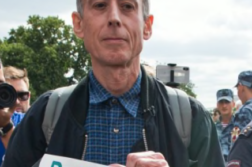The stereotypical images of southern Italy as a land of pasta and mafia vendettas needs to be replaced with a new understanding of the Mezzogiorno, as the southern regions of Italy are collectively known. The region now has the distinction of electing the first openly gay regional president in the history of the Italian republic. In April, voters in Puglia, one of the largest southern territories, chose veteran gay activist and communist Nicola “Nichi” Vendola as their president, a position comparable to a governor in the United States. Vendola, 46, defeated the incumbent president Raffaele Fitto, a member of the Forza Italy party of Silvio Berlusconi, Italy’s conservative premier, and George Bush’s loyal ally.
The April elections were devastating for Berlusconi and his “House of Liberty” coalition, which has governed Italy for nearly five years. Berlusconi and his partners lost to the center-left Unione coalition in twelve regions, from the far north of the peninsula to Puglia, at the heel of the boot. The Right’s losses and the hard-won unity among the usually fractious forces of the center-left do not bode well for Berlusconi’s re-election in the national vote scheduled for the spring of 2006. As the British paper The Independent remarked, Berlusconi “will need to move heaven and earth if he is to avoid a wipe-out” next year. Few observers believe that he can pull off such a miracle.
The electoral success of the progressive forces in Italy after five years of Berlusconi’s government—its disastrous economic policies, unpopular involvement in Bush’s Iraq war, and reactionary social agenda—certainly is a welcome development. But Nichi Vendola’s victory in Puglia signifies more than that region’s rejection of Berlusconi, pointing to profound social and cultural change occurring in Italy.
Sociologist Enrico Finzi told the Italian online publication Gay News that Vendola’s election signaled a general weakening of homophobia in Italy, particularly in the traditionally more socially conservative South, and the arrival of a more progressive “Catholic social culture.” (Vendola himself is a professed Catholic, albeit a radical one who has criticized the Church for its sexism and homophobia.) Still, Vendola’s win in Puglia did not signify a victory for gay culture per se or for identity politics, according to Puglia, but something of greater “symbolic value”: the fact that Vendola’s sexual orientation was not an issue for voters, despite attempts by his conservative opposition to make it one. Vendola commented that he was certain his openness about being gay actually helped him win.
The newly-elected president of Puglia did not, however, campaign as a gay activist, nor were gay issues his primary focus. Instead, he portrayed himself as a candidate both radical and traditional, an outspoken communist who was also a good Catholic son. Rather than deny the epithets that were hurled when his opponents turned to name-calling (as U.S. politicians instinctively do), Vendola embraced their barbs and turned them to his advantage. He issued a series of campaign ads in which he agreed that he’s “dangerous … like all honest persons”; “extremist … in my love for Puglia”; and “subversive … because I have always put first those who are last.”
As Finzi noted, Vendola also presented himself as a Catholic and as a figlio di mamma, a son who is deeply devoted to his mother, almost a mama’s boy. (This trait is widely admired by Italians.) Finzi observed that Vendola had brought some “potentially subversive diversity” to two of Italy’s “great traditions, Christian and familist” by insisting on his place within them as an openly gay communist. The son of Communists, Vendola became active in the Italian Communist Party when he was thirteen. At eighteen, he came out to his family and to the Party. He has said that although the Communists sometimes were discomfited by the publicity his prominence attracted, they nonetheless fully supported his work.
Vendola long has been an advocate for gays and lesbians, and he himself has been an “out” activist since he was a teenager. He joined and later became a leader of Arci Gay, the national activist organization that began as an offshoot of the Communist Party. But he has never been a practitioner of identity politics, choosing instead to situate gay issues within a broader radical agenda for social change. Indeed he has attributed electoral losses by other openly gay candidates to their failure to offer a progressive vision with wide appeal.
After the elections, Vendola told the liberal newspaper La Repubblica that his victory, and that of progressives throughout Italy, demonstrated that “the ruling classes are increasingly out of touch with the people.” The results validated a “different idea of politics, one founded on human rapport, the primacy of the people, the capacity to connect politics to life.” Vendola’s statements often reveal a philosophical bent. In fact, when he moved from Terlizzi, in Puglia, to Rome in 1984, he already had a doctorate in philosophy and had published a book of poems entitled Before the Battle.
Vendola’s first electoral victory was in 1987, when he ran for a seat in the Italian parliament as a Communist, and won, becoming Italy’s first openly gay legislator. He was repeatedly re-elected by Puglia’s voters, and during his eighteen-year tenure he distinguished himself as an environmentalist, an organized crime fighter (he co-chaired the parliament’s anti-Mafia commission), and an advocate for the rights of gays, women, the disabled, immigrants, and the mentally ill.
When the Communists disbanded in 1989, instead of joining the moderate Democratic Party of the Left, Vendola co-founded Rifondazione Comunista. The party, whose name translates awkwardly as “Communist Refounding,” is a unique entity in relation to both Italian radical politics and the history of the European Left. Though Rifondazione is decidedly anti-capitalist and retains the iconography of communism, including the hammer and sickle, its founders broke with Marxism-Leninism and its conception of the “vanguard party” whose supposedly superior theory entitles it to dominate the entire Left. Far from an ideological monolith, Rifondazione’s membership comprises, in addition to ex-Communists, former members of Maoist and Trotskyist groups. But its strong environmental orientation, support for minority rights—including those of gays and immigrants—and its defense of refugees from Berlusconi’s privatization of the economy, have attracted members from outside traditional Marxist sources.
Vendola’s victory comes at a time when gays, lesbians, and other sexual minorities have been appearing on the political radar screen more than at any time since World Pride 2000, the week-long celebration that culminated in a mass march through Rome. Last year, the right-wing, Vatican-backed politico Rocco Buttiglione denounced homosexuality as a sin, and in the resulting uproar he lost the post of Justice Commissioner in the European Union, to which he had been named by Berlusconi. The EU’s rejection of the Vatican’s man triggered an outpouring of anti-gay rhetoric and chest-beating from the Vatican and from political conservatives, one of whom complained that the “culattoni” (queers) were taking over Italy and Europe.
As in the United States, gays and lesbians have become highly visible in the media. There’s now an Italian version of Queer Eye for Straight Guy; and a TV miniseries about a tough cop accepting his gay son was a huge hit. Gay commentators abound on talk shows, and one of the nation’s most popular TV personalities is Mauro Coruzzi, who, in the persona of an outrageously camp drag queen, Platinette, has become a beloved national icon.
But, as in the U.S., visibility doesn’t necessarily mean political empowerment. Although there are no specifically anti-gay laws in Italy and the age of consent is fourteen for both heterosexuals and homosexuals, the Right, backed by the Vatican, has blocked attempts to enact pro-gay legislation. Some progressives have been fighting to pass a bill that would provide legal recognition to same-sex couples along the lines of the Civil Solidarity Pact passed in France in 1999. Others on the Left, both gay and otherwise, are pushing for same-sex marriage, although the more centrist members of the center-left coalition are opposed.
The late, obsessively homophobic Pope John Paul II made it his personal mission to block any and all pro-gay initiatives, and the accession of the former Cardinal Joseph Ratzinger to the papacy portends more of the same. One of Ratzinger’s first acts as Benedict XVI was to urge Catholics in Spain to prevent their government from passing same-sex marriage legislation and to defy the law once it is enacted.
Whether Nichi Vendola’s election and the resurgence of Italian progressives can overcome the toxic influence of the Vatican and the Right to re-align Italian politics over the long haul remains to be seen. But Nicola Vendola, who arrived in Rome some twenty years ago from the poor and often denigrated South, armed with poetry and militancy, already has achieved things of which gay radicals elsewhere only dream.




